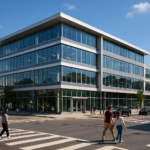Data centers are revolutionizing the commercial real estate (CRE) sector. As businesses and consumers generate more data than ever, the demand for these specialized facilities has surged. This growth has not only created new investment opportunities but has also redefined how CRE markets approach industrial space.
The Growing Demand for Commercial Real Estate Data Centers
Rising Data Usage
Businesses rely on data centers to handle ever-growing data volumes. As a result, they need reliable, secure facilities to store and process this information. Additionally, the rise of e-commerce and streaming platforms has further increased demand for these critical spaces.
Cloud Computing and AI Expansion
The shift to cloud-based operations and artificial intelligence applications has boosted the need for high-tech infrastructure. Companies that adopt these technologies must ensure their data is stored safely and processed quickly. This requirement has led many to invest heavily in data centers, which offer the scalability and security that modern businesses demand.
CRE Investors and Data Centers
Attractive Revenue Streams
Data centers typically sign long-term leases with well-established technology firms. This stability ensures predictable income for CRE investors. Additionally, these leases often include premium rates due to the specialized nature of the facilities.
High-Value Properties
The unique requirements of data centers—redundant power supplies, advanced cooling systems, and heightened security—set them apart from traditional industrial properties. As a result, properties equipped for data center operations often see substantial increases in value. For CRE investors, this makes data centers a lucrative addition to their portfolios.
Market Expansion Opportunities
While primary data center hubs remain critical, developers and investors are increasingly exploring secondary markets. These regions often offer more affordable land, access to renewable energy, and opportunities for tax incentives. Such factors are driving growth in locations previously overlooked by traditional CRE strategies.
Challenges and Considerations
Infrastructure Demands
Building and maintaining data centers require significant investments in power, cooling, and connectivity. Developers must navigate these challenges to deliver facilities that meet the stringent demands of their tenants.
Local Economic Impact
Data centers frequently bring new jobs and infrastructure improvements to their host communities. However, these projects must also address concerns about energy consumption and environmental sustainability. Explore more trends in CRE datacenters
Conclusion
Data centers have become a vital part of the commercial real estate landscape. They offer unique investment opportunities, stable revenue streams, and the potential to reshape how and where CRE markets develop. As demand for data-driven infrastructure continues to grow, data centers will remain a key driver of innovation and growth within the CRE industry.




